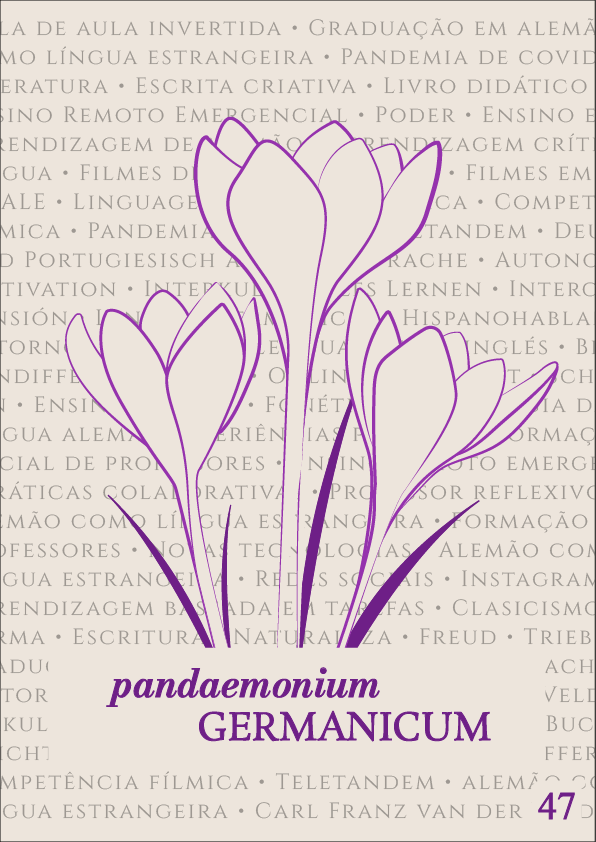Remote teaching in pandemic times: experiences with an emergency teacher training and its ramifications
DOI:
https://doi.org/10.11606/1982-88372547244Keywords:
German as a foreign language, Teacher training, New technologiesAbstract
The present article aims to describe an emergency teacher training that took place in July 2020 within the framework of the training of teachers of German as a foreign language (GFL) as part of the extension projects of three public universities in the state of Rio de Janeiro. The project was proposed and developed by teacher trainers from the three universities and was attended by undergraduate students working as teachers in the free language courses offered by the three participating institutions. The purpose of the training was to provide theoretical reflections and a practical introduction to online teaching, which, at that moment, was considered the only viable way of continuing to teach during the pandemic. This article will present the structure and content of the three weeks' training. Moreover, it presents and discusses the results of the evaluations given by the participants immediately after the course and one year later, in order to ascertain the role that the training may have had in their teaching practice.
Downloads
References
AQUINO, Marceli Cherchiglia. Mudando o ritmo das aulas de alemão como língua adicional. Pandaemonium Germanicum, São Paulo, v. 24, n. 42, 22-47, 2021. Disponível em: https://www.revistas.usp.br/pg/article/view/176694 (01/10/2021).
GARCIA D’AVILA MENEZES, Raquel. Adaptação de um curso de alemão em contexto acadêmico para o ensino remoto emergencial através de metodologias ativas. Signo, Santa Cruz do Sul, v. 46, n. 85, 170-179, 2021. Disponível em: https://online.unisc.br/seer/index.php/si-gno/article/view/15675 (01/10/2021).
GONDAR, Anelise Freitas Pereira; FERREIRA, Mergenfel Vaz. Formação docente e autodefinição profissional de formandos em ensino de alemão como língua adicional no Rio de Janeiro. São Paulo, D.E.L.T.A., v. 36, n. 2, 1-25, 2020.
GRÜNEWALD, Andreas. Digitale Medien und soziale Netzwerke im Kontext des Lernens und Lehrens von Sprachen. In: BURWITZ-MELZER et al. (Org.). Handbuch Fremdsprachenunterricht. [6.Auflage]. Tübingen: A. Francke, 2016, 463-466.
MARQUES-SCHÄFER, Gabriela. Competência midiática e tecnologias móveis: desafios e perspectivas para a formação de professores de Línguas Estrangeiras. Anais do 1º Congresso da Associação Brasileira de Estudos Germanísticos (ABEG), na Universidade de São Paulo, 2015. Disponível em: http://germanistik-brasil.org.br/wp-content/uploads/2016/05/Gabriela-Marques-Schaefer1.pdf (01/10/2021).
MORAN, José Manuel. Mudando a educação com metodologias ativas. In: Convergências Midiáticas, Educação e Cidadania: aproximações jovens. Coleção Mídias Contemporâneas, 2015. Disponível em: http://www2.eca.usp.br/moran/wp-content/uploads/2013/12/mudando_moran.pdf (01/10/2021).
RIBEIRO, Marina Lopes; GODIVA, Stephanie; BOLACIO FILHO, Ebal Sant’Anna. Ensino remoto emergencial e formação de professores de línguas adicionais. Revista Linguagem em Foco, v. 13, n. 1, p. 237-256, 2021. Disponível em: https://revistas.uece.br/index.php/linguagememfoco/article/view/5010.10.46230/2674-8266-13-5010 (01/10/2021)
RÖSLER, Dietmar. Deutsch als Fremdsprache. Eine Einführung. Stuttgart: Metzler, 2012.
SANTOS, Aldenir Aparecida da Silva; FAGUNDES, Augusta Isabel Junqueira; OLIVEIRA, Cristiane das Graças; COSTA, Simone Gomes da. Avaliação de pólos de apoio presencial de EaD: um estudo comparado. Simpósio Internacional de Educação a Distância, 3. São Carlos: UFSCar, 2016. Disponível em: http://www.sied-enped2016.ead.ufscar.br/ojs/index.php/2016/article/view/1125 (01/10/2021).
STANKE, Roberta Cristina Sol Fernandes; FERREIRA, Mergenfel Vaz; SCHEUENSTUHL, Maria Elisa de Oliveira. Ensino remoto de línguas adicionais na extensão: relatos de desafios e perspectivas. VIII Congresso Nacional de Educação, 2021. Disponível em: http://www.editorarealize.com.br/editora/ebooks/conedu/2020/ebook3/TRABALHO_EV140_MD7_SA100_ID3830_10092020211920.pdf (10/2021).
UNICEF. Schools still closed for nearly 77 million students 18 months into pandemic – UNICEF. Comunicado de imprensa, 15 de setembro 2021. Disponível em: https://www.unicef.org/press-releases/schools-still-closed-nearly-77-million-students-18-months-pandemic-unicef (01/10/2021).
VOERKEL, Paul; BOLACIO FILHO, Ebal Sant’Anna. Zu Verwendung und Potential von Online-Lernprogrammen und Apps für den Deutschunterricht: Erfahrungen aus Brasilien. Linguagem & Ensino, v. 23, p. 429-455, 2020. Disponível em: https://periodicos.ufpel.edu.br/ojs2/index.php/rle/article/view/17577 (01/10/2021).
Downloads
Published
Issue
Section
License
Copyright (c) 2022 Pandaemonium Germanicum

This work is licensed under a Creative Commons Attribution-NonCommercial-NoDerivatives 4.0 International License.



